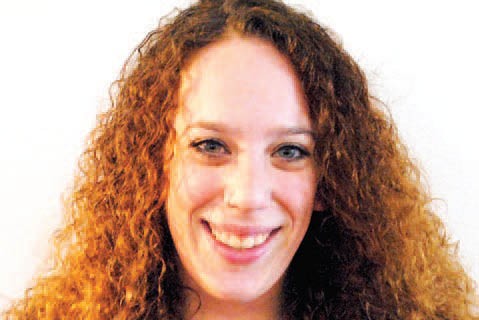Civic Engagement
The whole of a Cornell education is infused with the importance of civic engagement.
As America moved from the Atlantic to the Pacific, the small towns in between needed educated people to serve their communities,” said Jim Brown, special assistant to the president. “They needed teachers, they needed ministers, and they needed doctors and lawyers and bankers.”
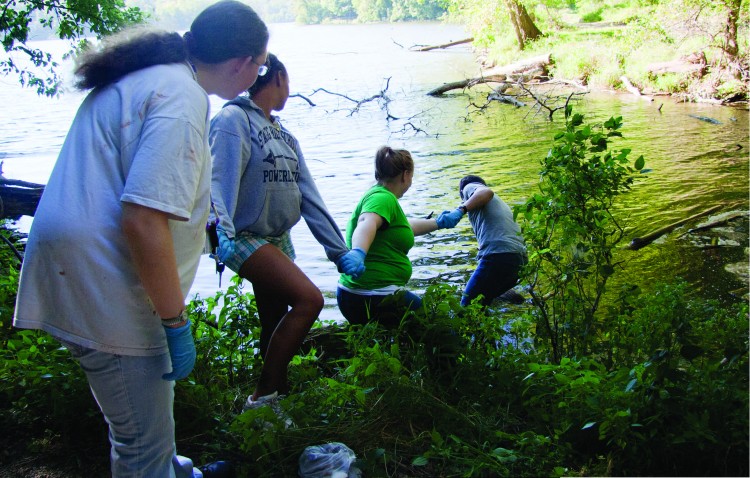
“Part of the goal of any successful college or university is graduating thoughtful, purpose-driven leaders who are committed to making a difference and solving some of the world’s problems,” said Cornell President Jonathan Brand. A liberal arts education helps that go even further, he said, because students learn skills, and they also learn the value—both intrinsic and extrinsic—of life. That means not only are they prepared to change the world, they understand why that drive to make things better is important.
“It’s more than just volunteering, or going into the Peace Corps,” he said. “Civic engagement is an approach to the world, and we need to think of it in an expansive way.”
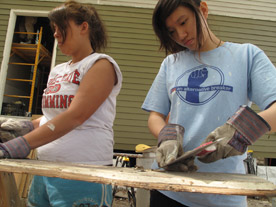
Starting this fall Cornell is offering an academic minor in civic engagement. The minor—and a commitment to service—is part of the college’s long history of turning out graduates who want to have an impact on the wider world. The faculty committee that recommended the civic engagement minor defined it this way: “Civic engagement means involvement as citizens and leaders in all social spheres beyond the family, including local, state, national, and international communities.”
In addition to the doctors, lawyers, and teachers who still come from Cornell, many students and alumni find themselves involved in civic engagement in a variety of ways. They are advocates for the elimination of nuclear weapons, they are philanthropists, they are elected officials.
Even before they graduate, Cornell students are involved in the world. Last year, 700 Cornell students performed some kind of community service through the college’s Civic Engagement Office, according to Kara Trebil, director of civic engagement. Service is encouraged from the beginning—literally—of their time at Cornell. Each year during New Student Orientation, students head out to various places around Eastern Iowa to perform community service. This year they helped out at Mount Vernon and Lisbon parks, Lake Macbride, Tanager Place, the Matthew 25 Urban Garden in Cedar Rapids, and more.
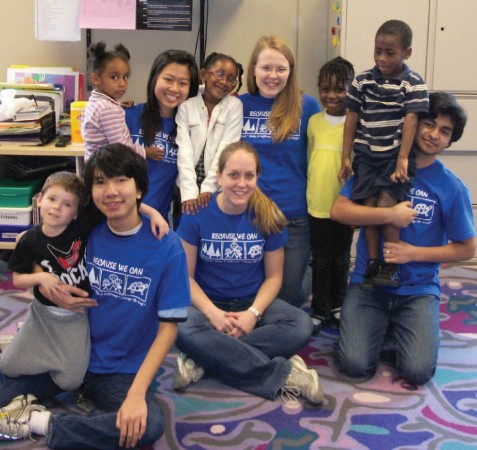
Direct service like this isn’t really the purpose of the Civic Engagement Office. The goal, Trebil said, is to get students to think about the many ways they can serve their communities, and to think about the problems they see and how they can be part of a solution. But exposing new students to service—and to the variety of opportunities that are out there—early in their Cornell careers is important, because service is a habit.
It takes time to acquire the habits of service, and that’s why the college provides opportunities.
And students today are more committed to service than ever before. Nearly all new students enter Cornell having completed some kind of community service requirement in high school, and they continue that dedication in college. Last year, seven students participated in the Iowa Campus Compact AmeriCorps Program (ICAP), where each of them committed to performing 300 hours of community service.
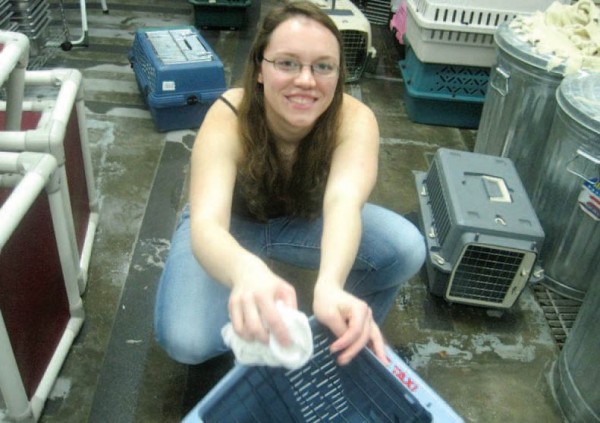
One student committed to service and civic engagement is Chelsea DeLarm, a sophomore from Indiana. DeLarm, who was named volunteer of the year by the Student Activities Office, lived on a Connect Floor (a floor for first-year students dedicated to a particular goal, in her case, service) last year, and spent time with her floormates building a community based around service to others. She was also involved in ICAP.
And, she said, some of her classes, particularly her education classes, focused not just on ways to get involved, but looked at problems and help find solutions.
There are, of course, opportunities for those students who can’t put in 300 or more hours of service, and that’s part of what Trebil’s office handles. There are direct-service opportunities, yes, but the goal is to push beyond that, to find out what a student is interested in and figure out how to get that student involved.
“We want them to think about what role they play in the solution,” Trebil said.
Helping students understand why service matters and how they can get involved with the world at large is part of the rationale for the civic engagement minor, said Joe Dieker, dean of the college. The larger goal is to bridge the gap between academics and students’ lives: to put what they learn in line with what they do. A civic engagement minor is rare in the United States, though many other liberal arts schools do have an academic component to their service programs. Cornell’s minor requires six courses—ethics, anthropology or sociology, politics, research methods or critical thinking, a course on addressing societal issues, and a course in applied civic engagement—along with at least 25 hours of service over two semesters.
The minor and indeed the idea of academic courses on service and civic engagement are relatively new, but the idea that Cornellians should serve is not new at all, the Rev. Richard Thomas, college historian and emeritus history professor, wrote in a 2000 paper.
“As far as I can determine, at least through the mid-20th century, the college never had an academic course on leadership and service,” Thomas wrote. “I believe this is true for several reasons. First, that was the purpose of the entire college curriculum—something you acquired by being part of the entire enterprise, not a course to be taken and forgotten. Second, the faculty was expected to model not only the values of leadership and service but through interaction with students to help them become better practitioners of democratic leadership.”
And, indeed, it sometimes seems like the entirety of a Cornell education is preparing people not just to work, but to lead and serve in their communities.
That’s been the experience of trustee Bob McLennan ’65.
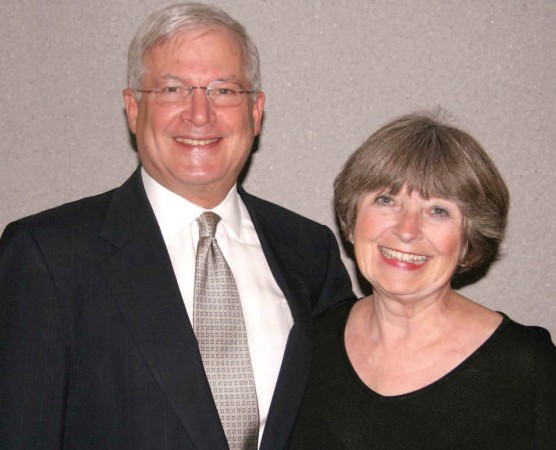
McLennan, a Chicago-area businessman, has been involved with service for years, and he credits the liberal arts education he got at Cornell as the impetus behind that. He and his wife, Becky Martin McLennan ’64, are founding members of an international organization called L3, which stands for Life, Leadership, and Legacy. The goal of the organization is to bring together people who want to have an impact on the world and help them find ways to make a difference.
McLennan, who decided at age 50 to give half his time away, also spent 19 years on the board of Advocate Healthcare, and served as a village trustee in Glenview, Ill. He was asked to be a trustee because of his background in real estate development, he said, and he wanted to give back to the place where he and Becky raised their family.
It was his liberal arts education that opened his mind to the different possibilities for service, he said. “When you’re aware of the world around you,” he said “there will be things that tug at you. You think, ‘I’ve got something, maybe I could contribute.'”
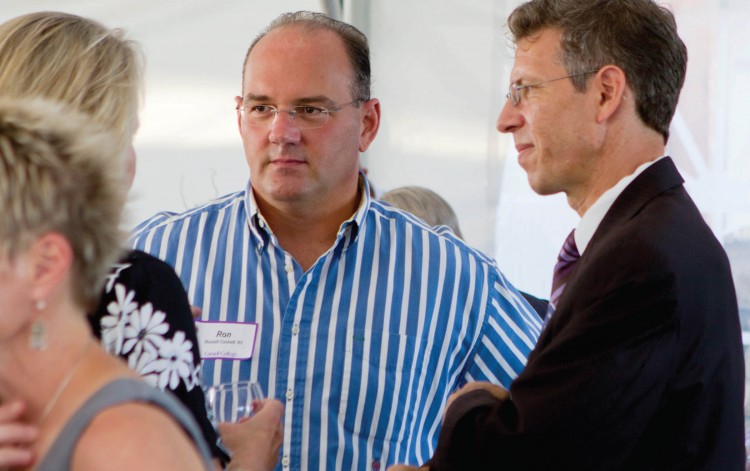
(Photo by Minda Davison)
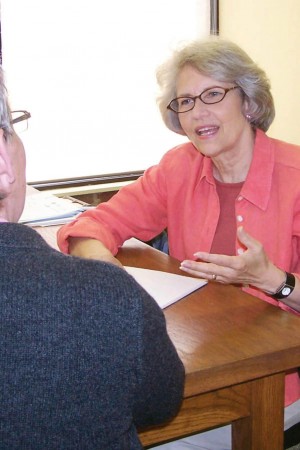
From a young age, Mary Morse ’69 had the sense that she had a responsibility to give back. Her father was a professor and consumer advocate, and her mother was a county commissioner. While at Cornell, she was part of a group that tutored students in Cedar Rapids, Iowa. It was a turbulent time, she said, with the Vietnam War and the civil rights and women’s rights movements. During her senior year, she and some others decided to teach Cornell women about birth control—a move that did not endear her to some in the administration. Morse spent time working with Planned Parenthood and the YWCA, and she now volunteers as a mediator with the Center for Conflict Resolution, in addition to grassroots organizing and philanthropy.
She said her Cornell education taught her the analytical skills she needed to succeed, but the sense of community taught her something, as well. Because of the small size of Cornell, she dealt with and respected people with views different from her own.
“You had to talk with people with different opinions,” she said. “You couldn’t demonize people who disagreed.”
Ron Corbett ’83 also credits Cornell for a share of his success in the public sphere. Corbett ran for the Iowa House shortly after graduation, where he served for 13 years, the last five as the youngest Speaker of the House in state history. He attributed his election to his willingness to go door-to-door talking to voters. And his ability to do that, he said, came from Cornell. Because of One Course At A Time, students had to interact with each other during the extended class periods, he said, and that got him comfortable talking to many different people.
In 2009, after a decade out of elected office, Corbett was elected mayor of Cedar Rapids. He ran, he said, because he thought the June 2008 flood paralyzed some city leaders, and things weren’t getting accomplished. “As someone who cared about the community, I felt like I had to get involved again,” he said.
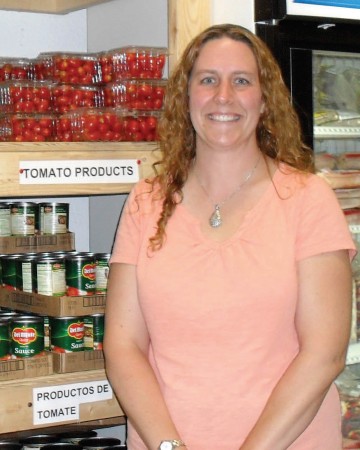
For Tina Effner DuBois ’99, a Cornell education helped start her on the path to where she is now: executive director of the North Liberty Community Pantry. While at Cornell, the elementary education and psychology major had a practicum at Tanager Place in Cedar Rapids. She got a job there after graduation, and then pursued a master’s degree in social work. For her master’s practicum, she worked at the community pantry. Then she got the job there, and helped turn it into a model pantry for the region and the nation. But beyond the connections she made at Cornell, the things she learned—adaptability and flexibility from One Course At A Time, a sense of the importance of service and education from her course work—have helped her tremendously, she said. As the pantry’s only employee (everyone else is a volunteer), she does everything from advocate for public policy changes to helping get food to families.
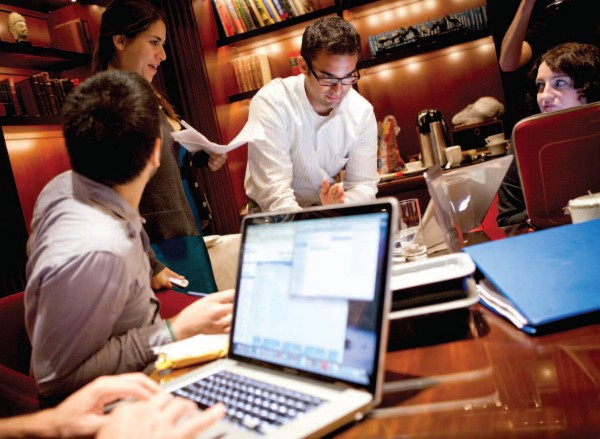
Derek Johnson ’04 said Cornell helped him realize his ambition to change the world. Classes and co-curricular activities taught him how to interact with people, solve problems, and make lasting, positive change. Now the chief of staff at Global Zero, a Washington, D.C.-based organization dedicated to the elimination of all nuclear weapons worldwide, he works with young people and heads of state to try and further his organization’s mission.
“Global Zero is civic engagement at its finest,” said Johnson, an attorney who serves on Cornell’s Alumni Board. “We’re facing humanity’s single greatest challenge and asking world leaders to set aside the most powerful, devastating weapons known to mankind. We have a truly historic opportunity to rid the world of nuclear weapons and change the course of human events, and we’re mobilizing hundreds of thousands of people, from heads-of-state to high school students, to seize that moment before it passes by. Having even a small part to play in the pursuit of that vision is incredibly exciting. And looking back, I’m convinced that my decision to attend Cornell College is what led me here.”
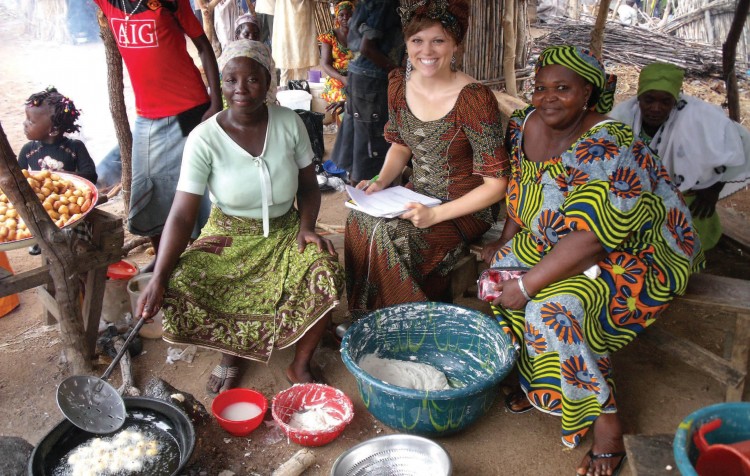
(Photo by Brittany Atchison ’10)
After graduation Brittany Atchison ’10 went to Nigeria through the Iowa-Nigeria Partnership, sponsored by the United Methodist Church. She helped to start EmpowHER, a micro-finance initiative designed to give women the chance to start their own business. Within six months of starting, the project had 40 groups and 400 entrepreneurs. When she left Nigeria this spring the repayment rate for the loans was 100 percent, and she estimated EmpowHER had an impact on more than 20,000 people.
And it was her time at Cornell that sparked her interest and gave her the chance to learn about the causes of and solutions to poverty. She had internships and courses in Africa and South America, and she founded Students Together Eradicating Poverty on campus.
“It’s more than a slogan,” Atchison said. “Civic engagement is a lifestyle. It’s a commitment to something greater than yourself.”

